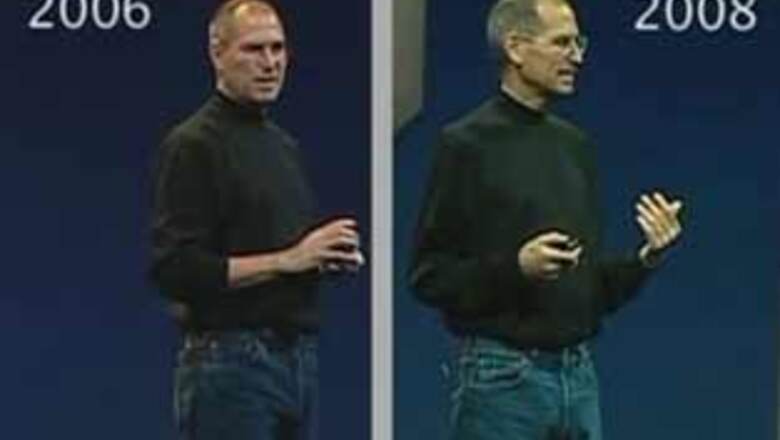
views
Los Angeles: Steve Jobs became a household name as the founder and chief executive of Apple Inc, marshaling his bravado and charisma to drive the innovation machine behind the iPod and iPhone.
Deemed irreplaceable by legions of Apple fans and investors alike, Jobs said on Wednesday he would take a medical leave of absence until the end of June because his health problems are "more complex" than he had thought.
SOME QUICK FACTS ABOUT STEVE JOBS:
Jobs, 53, was adopted and raised in Mountain View, California, now in the heart of Silicon Valley.
Jobs helped usher in the age of personal computers in the late 1970s, when he co-founded Apple with fellow electronics enthusiast Steve Wozniak. The pair worked out of Jobs' family garage.
Worked for the game company Atari before founding Apple in 1976.
He left Apple in 1985 when he lost a power struggle and returned to the company a dozen years later. Jobs has been Apple CEO since.
Co-founded Pixar Animation Studios in 1986, which has spawned movie hits Toy Story, Finding Nemo, and The Incredibles.
Pixar merged in 2006 with the Walt Disney Company. Jobs serves on the Disney board of directors.
He is married and has three children.
In 2004, he had surgery for a rare form of pancreatic cancer, known as an islet cell neuroendocrine tumor, which represents about 1 per cent of the total cases of pancreatic cancer diagnosed each year.
Steve Jobs on Wednesday announced he was taking a six-month medical leave of absence as chief executive of prompting concern not only about the prognosis for his health but also for his company.
He revealed just last week he was suffering from a hormonal imbalance that he said was relatively simple to cure.
Apple shares were halted ahead of the announcement, which came in the form of a copy of an e-mail sent to all employees. The shares then fell nearly 10 per cent in extended trading to $76.88 on the news.
"In order to take myself out of the limelight and focus on my health, and to allow everyone at Apple to focus on delivering extraordinary products, I have decided to take a medical leave of absence until the end of June," Jobs said in the e-mail.
Tim Cook, Apple chief operating officer, will be responsible for the day-to-day running of operations in the interim, he said.
Jobs said he planned to remain involved in major strategic decisions and had the full support of the board of directors.
"I look forward to seeing all of you this summer," he said.
John Coffee, professor of law at Columbia Law School said Apple's independent directors should now be looking for a new chief executive.
"You have to have a process in place now that you have an ill CEO. In circumstances like this, you can't assume he will get better," he said.
Jobs has been critical to a revival in Apple's fortunes over the past 10 years, leading the introduction of successful products such as the iMac, iPod and iPhone.
But, in spite of successful treatment for pancreatic cancer in 2004, fears have grown about his health. Over the past year, he has looked noticeably thin and haggard at Apple news conferences.
Jobs finally provided an explanation last week. He said doctors had discovered a hormonal imbalance that had been "robbing me of the proteins my body needs to be healthy".
He said he would stay on as chief executive as he regained the weight he had lost, which would take until late spring.
However, just 10 days later, Jobs' e-mail suggested a deteriorating situation where he was stepping aside and would not be able to return until the summer.
"There is no other Steve Jobs. As a public face, and a rallying place for the company, he's very hard to replace," said Mike McGuire, analyst with the Gartner research firm.
However, McGuire said Apple executives - in particular, Tim Cook, who ran the company during Mr Jobs' surgery - were capable of keeping the company on course.
Dr Run Yu, medical director of the Carcinoid and Neuroendocrine Tumor Center at Cedars-Sinai Medical Center in Los Angeles said Mr Jobs' condition could be more serious than was previously thought.
"His history of the partial pancreatectomy, and Type-1-like diabetes could complicate any recovery efforts," he said.
Jobs admitted on Wednesday speculation was still dogging the company. "The curiosity over my personal health continues to be a distraction not only for me and my family, but everyone else at Apple," he said.
It's official: temporarily--from his post at Apple Computer, taking a medical leave of absence to deal with a health problem that has turned out to be "more complex" than the celebrity CEO had originally event earlier this month. On a personal level, I can't help but have a great deal of sympathy for Jobs and his family at this undoubtedly difficult time.
But as a longtime Apple observer, Mac user, and general technology wonk, I can't help wondering what might come of Apple if and, inevitably one day, when Jobs eventually retires permanently from his role as the company's spiritual and temporal leader.
A whole lot of notions come to mind when you think of Steve Jobs. He's a charismatic figure, of course, one of the true tech visionaries who saw the role that computers would ultimately play in our personal lives many years before any given computer was capable of living up to his vision.
He's an innovator, pushing incessantly to bring new ideas to market, sometimes for the worse (like that toilet-seat iBook), but often for the better anyone?).
To say that Jobs has earned a reputation as a difficult person to work for would be putting it mildly.
Tales of his ceaseless browbeating of Apple employees are the stuff of legend, but this appears to have done nothing to lessen the respect that his minions feel for him. An obsessive tyrant he may be, but it seems that those who serve under him would follow him into the gates of hell without a second thought.
Meanwhile, the public face of Steve Jobs--that enthusiastic grin with which he declares every single new feature of every new Apple product to be "amazing," "incredible," or "unbelievable"--manages to inspire a deep affection and loyalty among consumers that no person in the world of technology (or any other business, for that matter) can match.
Even when he billed the terrible old as "the coolest mouse on the planet" back in 1998, he managed to elicit a totally sincere wow from his audience of faithful devotees. What other CEO can work such Jedi mind tricks?
It's hard to imagine anyone--either among Apple's current leadership or elsewhere--taking the place of Steve Jobs. Certainly Apple's 11-year streak of successes has owed a great deal to the hard work of the many people under Jobs' command, but a look at the company's history suggests that without Jobs, there might well be no Apple Computer left today.
After Steve Jobs was ousted from the company by John Scully back in 1985, the company entered a fairly steady decline--one which many educated observers predicted would culminate in the company's demise--until Jobs returned to take the helm in 1997.
Almost immediately, the Mac was back. Jobs put a stop to the Mac clone business that had kept the platform mired in mediocrity for years and released the iMac, then the iBook, then the cult-popular Cube and, of course, the iPod, iTunes, and the iPhone. Looking back at the wave of hot products the company churned out year after year, it's hard not to see the hand of Steve Jobs in every success.
What would Apple become in a post-Steve Jobs world? It's hard to say. Undoubtedly there is enough talent in the company's engineering and design teams to keep making innovative products that consumers will covet.
But is there anyone who can lead that team as effectively as Jobs? Can anyone make the tough and risky calls that have defined Jobs' resurrection of that company? I have a hard time imagining any of the Apple's current execs--including the company's low-key, who will now be filling in for Jobs--stepping into that role with the same fire and intensity that have become synonymous with the name of Steve Jobs.
And without that caliber of obsessively driven leadership, it's difficult to imagine how Apple, the underdog brand in the PC platform war, can continue driving its market share upward against Microsoft's pervasive presence.
Besides, who else at Apple can get so much mileage out of a simple, black turtleneck?




















Comments
0 comment